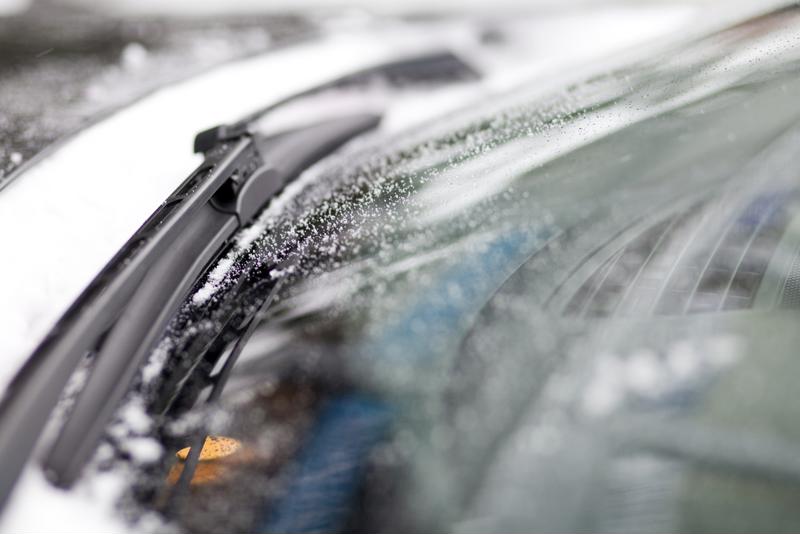Winter driving can be hazardous enough without having to worry about not being able to see. You can't control ice, snow and other winter precipitation, but you can at least ensure that if you do encounter adverse weather conditions, you're prepared to deal with them safely.
Your windshield performs an essential function during periods of winter driving. It keeps you warm and dry, but it's also a key part of road safety. Without clear visibility, driving in snow, sleet or ice becomes much more dangerous. But if you haven't given much thought to maintaining your windshield, you're not alone. It's a part of car ownership that many don't think about until a problem arises. This winter, head off potential problems by keeping your windshield clean and well maintained.
 Make sure your wiper blades are changed regularly and the arms are kept clear of debris.
Make sure your wiper blades are changed regularly and the arms are kept clear of debris. The wipers
Windshield wipers are of arguable utility when ice and heavy snow are common, but they're still an important safety feature and you should keep them running as smoothly as possible. Winter can be a particularly challenging time for windshield wipers. Not only does ice that builds up on your windshield strain the capabilities of your wipers, but snow and other winter precipitation can pile on top of the wipers themselves, creating maintenance issues if you don't pay attention.
Keep the wipers operating for as long as possible by cleaning any snow or ice off of your windshield. It's not enough to clear the windshield enough for basic visibility – you want to make sure the wiper arms themselves can move freely without being obstructed or weighed down by precipitation. In terms of the blades, you'll want to change them every year or couple thousand miles, and there are some telltale signs that your blades need changing. If your wipers streak, squeak or skip, these are all signs that the blades have worn down too much to be useful and you need new ones.
Even if the blades are in good condition, inspect the wiper arms regularly for signs of damage. Corrosion of the plastic or broken joints are both reasons to have your wiper arms replaced as soon as you can. Also worth noting: The rubber on your wiper blades can freeze in extreme temperatures, hardening it and making it less effective. Check your wipers on cold days to ensure the rubber is still soft and pliable.
"If you don't swap out your fluid, there's a chance that it can actually freeze in your tank."
The fluid
You probably don't spend too much time thinking about your windshield wiper fluid, but it's important to pay particular attention to this component in the winter. Snow, ice and salt can all wreak havoc on your visibility, especially if allowed to freeze overnight or sit on your windshield for days on end.
One important thing to note is that depending on which part of the country you live in, you may actually need to change your washer fluid when winter hits. According to Autybytel, summertime washer fluid tends to contain a much lower alcohol concentration than those fluids that are designed for winter use. As a result, if you don't swap out your fluid for a winter-approved variety, there's a much higher chance that it can actually freeze in your tank, at best rendering it useless and at worst creating additional maintenance problems.
The glass
It goes without saying that you shouldn't have any cracks, dings, divots or other nuisance damage spots in your windshield. Not only can these small imperfections compromise the integrity of the windshield itself, but cracks can cause their own visibility problems. The beginning of winter is a good time for an overall maintenance overhaul to your car, and you should include the windshield in this endeavor.
Once you've repaired any cracks or dings, focus your attention on ensuring the windshield stays clean. Water and salt can lead to a buildup of residue that can make it hard to see through the glass. If your washer fluid is designed for winter use, you can count on your wipers to keep the outside of your windshield clean, but don't forget about the inside. Regularly wipe down the interior or your windshield with streak-free glass cleaner and a microfiber cloth.
Your wipers can keep the glass clean, but they won't remove any physical obstructions. Leaves, twigs and other seasonal detritus can accumulate at the base of your windshield. If left unchecked, they can obstruct the path of your wipers, causing them to break down. Leaves and twigs can also block the airflow into your engine, creating larger maintenance problems down the road as well.
If you're in the market for a quality pre-owned vehicle, head to NJ State Auto Auction. With hundreds of Carfax-certified cars on the lot and a qualified and helpful in-house finance department, you can be confident you'll drive away in the right car for you.



